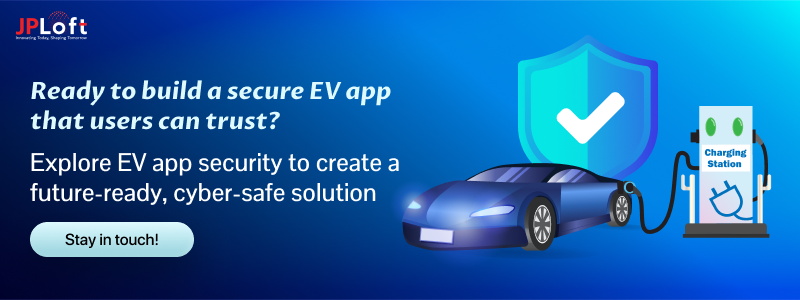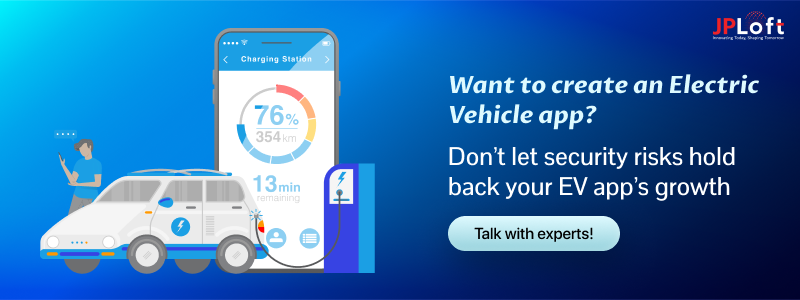Electric vehicles (EVs) are making mobility smarter and more connected, letting users find chargers, track batteries, pay, or control functions with a tap.
But here’s the real question: why is app security so crucial in the EV ecosystem? One weak link in security can jeopardize sensitive user data, financial transactions, and even vehicle safety. That’s where EV app security best practices come in as a savior.
According to MarketsandMarkets, the global EV market is projected to reach $620 billion by 2030, with smart EV apps playing a major role in driving adoption.
In this blog, we’ll dive into the top EV app security best practices that safeguard user data, protect privacy, and ensure safe, reliable app usage, so your EV app stands strong against evolving cyber risks.
Key Takeaways
Top EV app security best practices include multifactor authentication, biometrics, and end-to-end encryption to safeguard sensitive user data and financial transactions.
Protect integrations with charging stations, navigation tools, and vehicle controls using secure APIs, SSL/TLS, and encrypted connections.
Regular Audits & Compliance are important to conduct penetration testing, security audits, and follow global standards like GDPR, PCI DSS, and EV-specific regulations to maintain trust and avoid penalties.
User awareness & role-based access by educating users about security risks, implementing RBAC, and restricting access to sensitive operations to prevent misuse and insider threats.
As a trusted company that develops software for electric vehicles, JPLoft builds secure, scalable, and compliant EV apps, ensuring user trust and a future-ready mobility experience.
What is EV App Security? A Simplified Overview
When we think of electric vehicles (EVs), we usually imagine advanced batteries, eco-friendly rides, and futuristic dashboards.
But there’s another element that doesn’t always get the spotlight: Electric Vehicle app security. Without it, all the smart features of EVs can quickly turn into potential vulnerabilities.
So, what exactly does it mean?
In simple terms, EV app security refers to the safeguards, technologies, and strategies used to protect the mobile apps that connect with EVs.
These apps manage critical tasks like charging payments, navigation, battery monitoring, and even remote control of vehicle functions.
Now, imagine if one of these systems were hacked; it could put sensitive user data, financial transactions, and even passenger safety at serious risk. That’s why EV app security is so important.
Developers today rely on Electric Vehicle app security best practices such as multi-factor authentication, encrypted communication, secure APIs, and proactive threat monitoring.
These measures don’t just protect the app; they also ensure security in EV apps while making them safe, trustworthy, and reliable for users.
In short, EV app security is much more than a technical feature; it’s a shield that protects drivers, data, and the very future of sustainable mobility.
By prioritizing it, businesses and developers can build apps that truly earn user trust while meeting the highest standards of digital safety.
Security Is Just One Piece: Core Essentials of EV Apps
While mobile app security is absolutely crucial, building a truly reliable EV app goes beyond just encryption and firewalls.
A successful app needs to balance security, usability, scalability, and compliance to deliver a seamless user experience.
Here are the other core essentials for a secure EV app that every business should focus on:
A] User-Friendly Design
A great EV app isn’t only about safety; it’s also about convenience. Complex navigation, cluttered menus, or too many steps frustrate users.
A user-friendly design ensures simplicity, efficiency, and smooth interaction for drivers on the go. Remember, a secure app that isn’t easy to use won’t win long-term trust.
B] Data Encryption in EV Apps
Passwords are no longer enough. EV apps process highly sensitive details such as payment credentials, driving records, and vehicle performance data.
Using advanced data encryption in EV apps helps keep this information safe from hackers. It also strengthens user trust by proving that protecting privacy is a priority.
C] Seamless Connectivity
EV apps depend on real-time communication with charging stations, navigation systems, and the vehicles themselves. If connections lag or break down, users lose confidence.
Just as Electric Vehicle app security tips ensure safety, smooth integration ensures consistent performance and reliability.
D] Scalability & Performance
With EV adoption growing globally, apps must handle thousands, even millions, of users at once. Downtime or crashes can damage reputation instantly.
That’s why Secure Electric Vehicle solutions focus on both speed and scalability while making sure performance never compromises security.
E] Compliance & Regulations
In the digital world, compliance isn’t optional. From GDPR to EV-specific safety guidelines, every app must follow strict standards that protect Electric Vehicle app data and user privacy.
Failing to meet compliance not only risks penalties but also undermines credibility.
In essence, security in EV apps is the foundation, but pairing it with usability, scalability, compliance, and seamless functionality creates a complete, trustworthy solution. This holistic approach ensures that EV apps aren’t just secure but also practical, reliable, and future-ready.
Common Threats to Electric Vehicle App Security
Like any digital platform, EV apps face multiple risks that can compromise both user trust and overall system reliability.
With sensitive data, financial transactions, and real-time vehicle controls involved, even a small breach can have serious consequences. Let’s look at the most common EV adoption challenges and how to prevent them:
A) Data Breaches
-
Threat: Hackers accessing sensitive user information such as payment details or driving records.
-
Prevention: Implement strong data privacy in EV apps, multi-factor authentication, and data encryption in EV apps.
B) Unauthorized Vehicle Access
-
Threat: Attackers gaining remote control of EV functions via compromised apps.
-
Prevention: Follow EV platform security standards, secure APIs, conduct frequent security audits, and hire dedicated developers with expertise in EV app security best practices to ensure robust protection.
C) Malware & Phishing Attacks
-
Threat: Users downloading malicious apps disguised as official EV platforms.
-
Prevention: Educate users with Electric Vehicle app security tips, ensure app store verification, and deploy advanced malware detection.
D) Compliance Failures
-
Threat: Not meeting Electric Vehicle compliance standards, leading to penalties and loss of user trust.
-
Prevention: Regular compliance checks, secure coding, and integrating EV app security best practices into development cycles.
By addressing these EV app security threats early, businesses can build safer, more trustworthy apps for the rapidly growing EV ecosystem.
10 Essential EV App Security Best Practices You Should Know
Building an EV app isn’t just about sleek design or smooth performance; it’s about trust.
With millions of drivers relying on these apps for navigation, payments, charging, and even remote vehicle control, EV app security best practices have become more important than ever.
A single breach can put sensitive data at risk, compromise safety, and damage your brand’s reputation. That’s why secure development of EV apps is no longer optional; it’s the foundation of user confidence.
In fact, strong security measures are now seen as a key differentiator in the competitive world of electric vehicle software development.
To help you create future-ready apps, here’s a breakdown of the 10 essential Electric Vehicle app security best practices every developer, business, or stakeholder should know.
1. Implement Strong Authentication Mechanisms
Consider how frequently you access your bank account; ensuring it remains secure from hackers is crucial, isn't it? The same applies to EV apps.
Weak login systems are one of the easiest targets for cybercriminals, which makes strong authentication a must-have feature when exploring electric vehicle app ideas.
-
Use multi-factor authentication (MFA) to add extra layers of security.
-
Adopt biometric authentication such as fingerprint or facial recognition, for smoother yet secure user experiences.
-
Ensure password policies are strong, requiring combinations of characters, numbers, and symbols.
By prioritizing strong authentication, you protect Electric Vehicle app access from unauthorized users right from the start.
2. Encrypt All Sensitive Data
When it comes to data privacy in EV apps, encryption is non-negotiable. We should never leave sensitive details like payment information, personal data, and vehicle usage patterns vulnerable.
-
Ensure the protection of data both in transit and at rest by implementing end-to-end encryption.
-
Use advanced cryptographic algorithms to secure user communications.
-
Regularly update encryption protocols to prevent breaches from evolving threats.
Strong data encryption in EV apps prevents unauthorized access and builds long-term user trust.
3. Secure APIs to Protect Integrations
EV apps rely heavily on APIs to connect with vehicles, charging stations, and third-party platforms. But insecure APIs are a major EV app security threat.
-
Limit API access with strong authentication tokens.
-
Monitor API traffic for suspicious behavior.
-
Regularly patch and update API gateways.
API security should be a key part of your app development process because one loophole can open doors for attackers.
4. Regular Security Audits and Penetration Testing
Prevention is always better than cure, especially when it comes to EV app security.
Regular testing helps identify vulnerabilities before hackers exploit them and ensures your app aligns with the latest EV app development trends, where security is a top priority.
-
Conduct periodic penetration testing to simulate real-world attacks.
-
Audit your systems for compliance with Electric Vehicle platform security standards.
-
Maintain a secure Electric Vehicle checklist to track ongoing updates and patches.
Consistent testing ensures you stay one step ahead of cybercriminals.
5. Ensure Compliance with Global Standards
Compliance isn’t just a legal box to tick; it’s about protecting users. From GDPR in Europe to region-specific EV safety regulations, Electric Vehicle compliance is critical for credibility.
-
Align your app with international data privacy laws.
-
Follow local automotive cybersecurity standards.
-
Maintain transparent policies on how user data is stored, shared, and protected.
Meeting compliance requirements strengthens trust and prevents costly penalties.
6. Protect Against EV App Piracy
App piracy is a growing concern that affects not only revenue but also security. Fake or cloned apps trick users, putting their data at risk and damaging user trust.
This makes it critical for businesses to adopt proactive app security for EV platform strategies.
-
Use advanced encryption to prevent Electric Vehicle app piracy.
-
Monitor app stores for cloned versions of your app.
-
Encourage users to download only from verified sources.
Protecting against piracy safeguards both your business reputation and your users’ safety.
7. Adopt Role-Based Access Controls (RBAC)
Not everyone needs access to everything. Limiting access is one of the simplest Electric Vehicle app security tips that goes a long way.
For example, when you build an EV charging station finder app, not all employees or third-party partners should have full control over user data or payment systems.
-
Grant access rights based on job roles.
-
Restrict sensitive operations to authorized personnel only.
-
Keep logs of access requests and approvals.
This approach helps protect Electric Vehicle apps from insider threats and misuse.
8. Secure Communication Channels
EV apps often involve real-time communication between users, vehicles, and infrastructure. Unprotected channels create vulnerabilities.
-
Use secure socket layers (SSL/TLS) for communication.
-
Apply strong encryption for Bluetooth and Wi-Fi connections.
-
Monitor traffic to detect unusual patterns.
By securing communication, you minimize the chances of interception and maintain app security for EV platforms.
9. Educate Users About Security Best Practices
Even the most secure apps can be compromised if users aren’t aware of threats. Phishing attacks, weak passwords, or careless downloads all create risks.
That’s why educating users is vital, especially if you’re looking to start a mobile EV charging business, where customer trust and secure interactions play a key role in success.
-
Share regular Electric Vehicle app security tips with users.
-
Send alerts about suspicious activity.
-
Provide easy-to-follow guides for updating and securing accounts.
User awareness is a powerful weapon against EV app security threats.
10. Hire Experts to Secure App Development
Technology evolves rapidly, and so do cyber threats. The best way to stay ahead is to rely on skilled professionals.
-
Hire mobile app developers with experience to secure your EV app.
-
Partner with teams that understand Electric Vehicle platform security and compliance.
-
Continuously upskill your development team with the latest cybersecurity training.
A strong, skilled team ensures your app follows every item on the secure Electric Vehicle checklist.
The EV industry is booming, but with growth comes risk. Apps are now gateways to sensitive data, financial details, and even direct control over vehicles. Ignoring security isn’t an option; it’s a liability.
EV Apps Compliance & Privacy Best Practices
When it comes to EV app security, compliance and privacy cannot be overlooked. Regulations ensure that user data is protected and apps meet global standards.
Ignoring compliance can not only lead to legal penalties but also erode user trust.
Here are some EV app security best practices around compliance and privacy:
-
Data Privacy in EV Apps: Always encrypt sensitive data like payment details, driving patterns, and charging history.
-
Electric Vehicle Compliance: Adhere to standards such as GDPR, PCI DSS, and EV-specific regulations that prioritize user privacy.
-
Audit & Documentation: Keep clear records of updates, consent, and compliance checks for smooth reporting.
-
Transparency with Users: Notify users about what data is collected, why, and how it will be used.
-
Third-Party Integration Security: Ensure that all third-party APIs, such as payment gateways or navigation tools, meet strict security standards to avoid loopholes.
-
Regular Training for Teams: Educate developers and stakeholders about EV app security best practices to ensure everyone involved understands compliance, privacy, and security protocols.
Strong compliance paired with app security for EV platforms ensures both safety and long-term credibility.
JPLoft: Build a Secure, Scalable Electric Vehicle App
When it comes to creating future-ready EV apps, security, scalability, and user experience must go hand in hand. That’s where JPLoft, a trusted Electric Vehicle software development company, comes in.
With years of experience in mobility solutions, we specialize in secure EV apps that protects user data, prevents cyber threats, and ensures compliance with international standards. From data encryption in EV apps to seamless real-time connectivity, JPLoft ensures your app is built on a strong foundation of security and innovation.
Their expert developers provide tailor-made solutions, whether you’re aiming to protect Electric Vehicle apps from piracy, enhance Electric Vehicle platform security, or build an EV charging station finder app.
Partner with JPLoft today to transform your EV app idea into a secure, scalable, and future-ready product that users can trust.
Final Wrap-Up
In a connected world where apps power every EV experience, following EV app security best practices is not optional; it’s essential. From authentication and encryption to compliance and user education, each layer of protection contributes to building secure and reliable apps that drivers can depend on.
The future of mobility rests not only on sustainable energy but also on secure digital ecosystems. Businesses that invest in EV app will gain a competitive edge by offering safer, smarter, and more compliant solutions.
As EV adoption accelerates, one thing is clear: strong security measures protect not just the app but also users, data, and the future of electric mobility. Now is the time to make your EV apps more resilient, trustworthy, and future-ready.
FAQs
EV apps handle sensitive data like payments, charging details, and remote vehicle control. Without proper security, users and businesses face risks such as data theft, fraud, and safety breaches.
Phishing, weak authentication, app piracy, and insecure APIs are some major EV app security threats that developers must address proactively.
By using strong encryption, secure APIs, and following Electric Vehicle compliance standards like GDPR and PCI DSS, developers can ensure reliable data privacy.
Compliance ensures apps meet global standards for data protection and security. Following Electric Vehicle platform security guidelines prevents legal issues and builds trust.
To prevent Electric Vehicle app piracy, developers should use code obfuscation, monitor app stores for clones, and encourage downloads only from official sources.













Share this blog